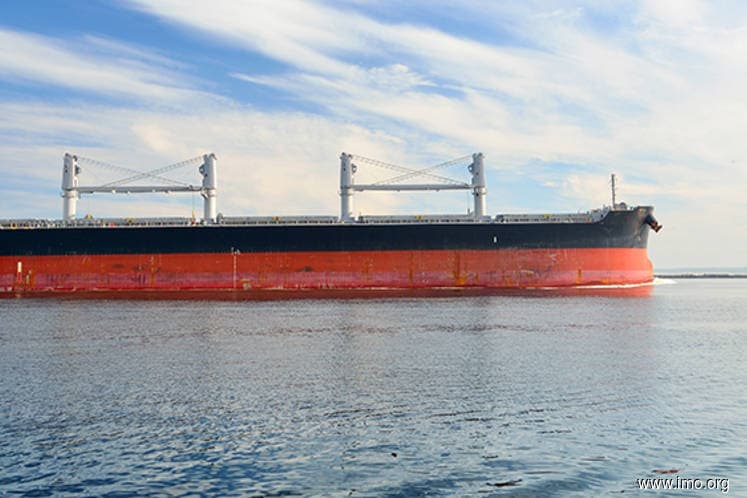
This article first appeared in The Edge Malaysia Weekly on October 22, 2018 - October 28, 2018
THE United Nations’ International Maritime Organization’s (IMO) plan to ban ships from using fuel with a sulphur content higher than 0.5% by 2020 (from 3.5% now), unless they are equipped to clean the sulphur, is expected to drive a shift in demand to marine gasoil (MGO).
The move will benefit Straits Inter Logistics Bhd, says managing director Datuk Seri Ho Kam Choy, who is also a substantial shareholder with about a 7.4% stake via Sturgeon Asia Ltd. He tells The Edge in an exclusive interview that the MGO supplied by the company currently has a sulphur content of 0.05%, which is far below the cap under the new ruling.
“We anticipate the market size will grow for the MGO bunkering business as more demand shifts to MGO,” he says, adding that a shift to MGO makes economic sense compared to alternatives such as the installation of “scrubbers”, or kits that strips out sulphur emissions and allow ships to use cheaper fuel oil with higher sulphur content.
The equipment alone would cost US$1 million to US$6 million, and will only be commercially viable for larger vessels, he points out.
“The installation of scrubbers could also lead to downtime as shipping companies would need to undergo tests and ensure stability of the vessels.”
Apart from the IMO’s new ruling, Ho notes that there is huge untapped potential in bunkering services for MGO in the country.
The market for bunkering services for MGO in Singapore was valued at about RM2 billion in 2017. While there is no official data on the market size for Malaysia, Ho reckons it should be about three times that of Singapore, or about RM6 billion.
“Of this RM6 billion, you will be shocked to know that 70% is being supplied by illegal operators. We are talking about RM4.2 billion there. Of the 30%, which is about RM1.8 billion, our group, with our enlarged capacity, is only about RM500 million. We’re not even doing about one-third. So, there is huge potential in the industry,” he says.
He points out that the group’s enlarged capability follows the acquisition of a 55% stake in Tumpuan Megah Development Sdn Bhd in September.
The acquisition transformed Straits Inter Logistics into one of the country’s largest oil bunkering players. With the acquisition, it has grown the number of vessels from two to nine, and enhanced its coverage to eight ports throughout Malaysia.
Ho says the group has seen a strong turnaround for its financial year ended Dec 31, 2017 (FY2017). It recorded a net profit of RM2.5 million compared with RM49,000 in FY2016, while revenue grew by 96% to RM134.6 million, from RM68.5 million a year ago.
The turnaround was due to its successful diversification into oil trading and bunkering services, from manufacturing and trading of water and air filter products before the acquisition of Tumpuan Megah.
The acquisition is viewed by Ho as a win-win strategy as Straits Inter Logistics is able to tap Tumpuan Megah’s existing customers and vessels while the latter can expand at a faster pace because it has better access to funding.
“Before we bought over the company, we had a contract with it for about RM45 million over six months. But since we only had two vessels and it had a bigger fleet, we went in there to tap its infrastructure. If we came together, we could tap on its infrastructure and it could gain funding,” Ho says.
As for the illegal operators, Ho says there is a need to improve the administrative and enforcement processes in the country’s marine fuel industry. Two agencies, namely the Marine Police and Malaysia Maritime Enforcement Agency (APMM), patrol Malaysian waters.
He adds however, that there has been an improvement in enforcement activity of late, with two vessels — a tanker and a fishing vessel — being detained by APMM last month. The two vessels were suspected of carrying out illegal ship-to-ship fuel transfers.
Ho says as both vessel owners and illegal operators will be charged, more owners would seek bunkering services offered by companies like Straits Inter Logistics.
“Awareness is catching on as more companies are coming to us. Apart from worries that enforcement action will be taken against them, a lot of the owners also realise that better quality oil will help save cost in the longer term as the vessels will last longer. Poor quality oil will corrode the engine,” he explains.
He says the group has had to turn away some business because of capacity and funding constraints.
This is reflected in its financials for the first half ended June 30, 2018 (1HFY2018), which saw net profit growing 12.5% to RM1.32 million from RM1.17 million in the corresponding period a year ago. However, the group’s earnings per share (EPS) fell about 50% to 0.36 sen per share from 0.71 sen per share. This was due to its enlarged shareholding following the new issuance of shares and private placement exercise to raise funds to acquire the Tumpuan Megah stake.
Rakuten Trade Sdn Bhd vice-president of research, Vincent Lau, in a report dated June 11, says he expects Straits Inter Logistics’ net profit for FY2018 to register double-digit growth and hit RM5 million.
But despite Ho’s optimism, the company’s share price has declined 14.3% over the past one year to close at 24 sen last Thursday, giving it a market capitalisation of RM133.7 million.
With the acquisition of Tumpuan Megah completed however, investors and shareholders will be looking closely at the group’s financial performance in the upcoming quarters.
Save by subscribing to us for your print and/or digital copy.
P/S: The Edge is also available on Apple's AppStore and Androids' Google Play.